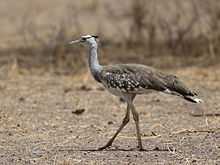Arabian bustard
The Arabian bustard (Ardeotis arabs) is a species of bird in the bustard family. It is part of the largest-bodied genus (Ardeotis) and, though little known, appears to be a fairly typical species in that group. As in all bustards, the male Arabian bustard is much larger than the female. Males have been found to weigh 5.7–10.9 kg (13–24 lb), while females weigh 4.5–7.7 kg (9.9–17.0 lb). The record-sized male Arabian bustard weighed 16.8 kg (37 lb). These birds stand from 70 cm (28 in) tall in females to 92 cm (36 in) tall in males.[2][3] They are fairly similar in overall appearance to the kori bustard, with a brown body, gray neck and white underside, but are noticeably smaller, with a more elegant, slender build. They are also differ in having white checkered covert pattern at the end of the folded wing, as opposed to various black-and-white patterns as seen in other large African bustards.[4] These birds mainly live off arthropods and larvae.[5]
It is found in Algeria, Burkina Faso, Cameroon, Chad, Ivory Coast, Djibouti, Eritrea, Ethiopia, Gambia, Ghana, Guinea-Bissau, Iraq, Kenya, Mali, Mauritania, Morocco, Niger, Nigeria, Saudi Arabia, Senegal, Somalia, Sudan, and Yemen. Due to its wide range, it was not considered vulnerable by IUCN, although there is believed to have been a strong decrease in the population. In 2012 the species was uplisted to Near Threatened.[6] The primary cause of the decrease appears to be heavy hunting pressure, with habitat degradation and destruction also playing a major role.[1]
External links
References
- ↑ 1.0 1.1 BirdLife International (2012). "Ardeotis arabs". IUCN Red List of Threatened Species. Version 2013.2. International Union for Conservation of Nature. Retrieved 26 November 2013.
- ↑ Dunning, John B., Jr. (ed.) CRC Handbook of Avian Body Masses. CRC Press (1992), ISBN 978-0-8493-4258-5.
- ↑ Wood, Gerald (1983). The Guinness Book of Animal Facts and Feats. ISBN 978-0-85112-235-9.
- ↑ Stevenson, Terry and Fanshawe, John (2001). Field Guide to the Birds of East Africa: Kenya, Tanzania, Uganda, Rwanda, Burundi. Elsevier Science, ISBN 978-0856610790
- ↑ Arabian Bustard. Worldbirds.eu. Retrieved on 2012-08-21.
- ↑ "Recently recategorised species". Birdlife International (2012). Retrieved 15 June 2012.
|
|---|
| | Subfamily | |
|---|
| | No subfamily | | |
|---|
| | |
|---|
| | |
|---|
| | |
|---|
| Houbaropsis | |
|---|
| | |
|---|
| | |
|---|
| | |
|---|
| Sypheotides | |
|---|
| Tetrax | |
|---|
|
|---|
| 20 living species in nine genera |
|

